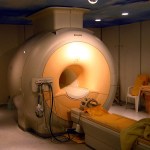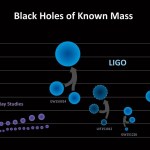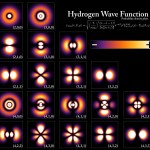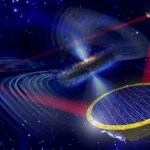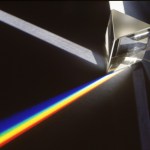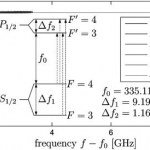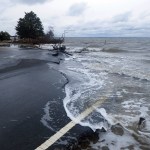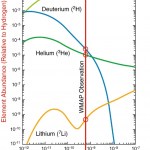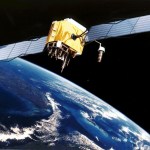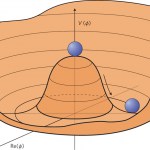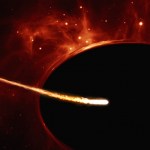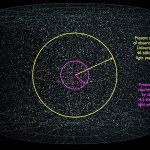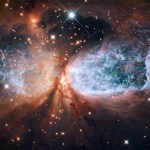Physics
"Even though the reason for taking the photographs was science, the result shows the enormous beauty of nature." -Miloslav Druckmuller, eclipse photographer
During those moments of totality, the Sun is eclipsed by a new Moon, with the latter’s shadow falling onto Earth. From within that shadow, the Sun’s disk is blocked entirely, revealing a slew of fainter objects: stars, planets, and the Sun’s corona, all of which cannot normally be seen during the day. Yet one object even brighter than all the stars -- the new Moon -- will remain invisible throughout the eclipse.
The Sun's atmosphere is…
"In the future, maybe quantum mechanics will teach us something equally chilling about exactly how we exist from moment to moment of what we like to think of as time." -Richard K. Morgan
It’s absolutely true that, in quantum mechanics, there are certain pairs of properties that we simply can’t measure simultaneously. Measure the position of an object really well, and its momentum becomes more uncertain. Measure its energy, and its time becomes more uncertain. And measure its voltage, and the free charge becomes more uncertain. Although this is disconcerting to some, it’s a fundamental part of…
“Honestly, if you’re given the choice between Armageddon or tea, you don’t say ‘what kind of tea?” -Neil Gaiman
Enjoying the Perseid meteor shower this year, as perhaps you do every August? As you look up, the great cosmic show might have a lot more to offer than mere streaks of light, due to cometary debris brightly burning up in the Earth’s atmosphere. This year, Jupiter has slightly disturbed the debris stream, resulting in an increase in the number of meteors-per-hour, as the stream passes quite centrally through Earth’s location.
The comet that gives rise to the Perseid meteor shower,…
"Our first priority was making sure we weren’t fooling ourselves." -Keith Riles, LIGO team member
When LIGO announced their first discovery of a black hole-black hole merger, it came as a surprise to almost everyone. The shocking part wasn’t that LIGO had seen merging black holes, but that they were discovered to be so massive. At right around ~30 solar masses each, these were black holes that were much larger than expected, forcing astronomers to confront the fact that they didn’t have a good, comprehensive model for how many black holes -- and what mass they should be -- were in the…
Another month, another collection of blog posts for Forbes:
-- The Physics Of Century-Old Mirror Selfies: Back in the early 1900's there was a brief vogue for trick pictures showing the same person from five different angles; this post explains how to do that with mirrors.
-- Why Research By Undergraduates Is Important For Science And Students: A reply to an essay talking up the products of undergraduate research projects, arguing that the most valuable part of research is the effect on students.
-- What Does It Mean To Share 'Raw Data'?: Some thoughts on the uselessness of much "raw data" in…
“If man is to survive, he will have learned to take a delight in the essential differences between men and between cultures. He will learn that differences in ideas and attitudes are a delight, part of life's exciting variety, not something to fear.” ―Gene Roddenberry
Well, it happened, everyone! I flew out to the official Star Trek convention in Las Vegas, and the people I met there and the events and panels I attended (and participated in) were largely fabulous! Best of all, I got to line up a number of future podcasts about science, Star Trek, and everything in between, so stay tuned in…
"Chlorine is a deadly poison gas employed on European battlefields in World War I. Sodium is a corrosive metal which burns upon contact with water. Together they make a placid and unpoisonous material, table salt. Why each of these substances has the properties it does is a subject called chemistry." -Carl Sagan
Every beginning chemistry student learns what happens when you put a chunk of sodium metal into water: you get an extremely violent reaction out. The sodium and water bubble and fizz, and sometimes even a flame or an outright combustion reaction is produced. This isn’t exclusive to…
"The years of searching in the dark for a truth that one feels but cannot express, the intense desire and the alternations of confidence and misgiving until one breaks through to clarity and understanding, are only known to him who has himself experienced them." -Albert Einstein
In 2015, for the very first time, gravitational waves were directly detected from the merger of two massive black holes. These ripples in space traveled over a billion light years before they were finally detected. When they were, it validated Einstein’s theory of General Relativity in an entirely new fashion, and…
"There was a young lady named Bright,
Whose speed was far faster than light;
She set out one day
In a relative way,
And returned on the previous night." -A.H. Reginald Butler
Throughout the entire Universe, there’s a fundamental law that governs the motions of all particles: Einstein’s relativity. It states that all particles with mass can never attain the speed of light, no matter how much energy you put into it. Additionally, all massless particles only move at the speed of light, no matter what you do to either them or to the device/person observing them. No matter what reference…
"In an expanding universe, time is on the side of the outcast. Those who once inhabited the suburbs of human contempt find that without changing their address they eventually live in the metropolis." -Quentin Crisp
The Universe is expanding. The farther away a galaxy is, the faster it appears to be receding from us. The standard story tells us that space itself is expanding, and that’s the cause, but it’s only natural to wonder if perhaps space is static, and everything else within it isn’t shrinking instead? Many laypersons choose to go this route, and question the entire field of cosmology…
"Climate change does not respect border; it does not respect who you are - rich and poor, small and big. Therefore, this is what we call 'global challenges,' which require global solidarity." -Ban Ki-moon
Earlier this week, the executive editor of the Heartland Institute published a declaration that he was a climate change skeptic, and put forth the six major reasons why this was so. These reasons were well-thought-out, specific, and best of all, subject to analysis. So, what better way to test the science than to do that analysis, and to see where the chips fell?
Correctly calibrated…
"Weakness of character is the only defect which cannot be amended." -Francois de La Rochefoucauld
So, you’d like to ruin the fabric of your space, would you? Similar to tying a knot in it, stitching it up with some poorly-run shenanigans, running a two-dimensional membrane through it (like a hole in a sponge), etc., it’s possible to put a topological defect in the fabric of space itself. This isn’t just a mathematical possibility, but a physical one: if you break a symmetry in just the right way, monopoles, strings, domain walls, or textures could be produced on a cosmic scale.
The…
"Lord of Light! Come to us in our darkness. We offer you these false gods. Take them and cast your light upon us. For the night is dark and full of terrors." -Melisandre, George R.R. Martin's A Song of Fire and Ice
Imagine a world where you know that winter is coming, but you don’t know when, or for how long, or how severe it will be. Sounds like fiction, doesn’t it? In our own solar system, where planets orbit a single star in elliptical, well-separated orbits, this is extraordinarily unlikely. But if a binary giant planet existed in the habitable zone, and a world like Earth orbited both of…
"The design of the universe...is very magnificent and shouldn’t be taken for granted." -Charles W. Misner
One of the more puzzling aspects of our Universe is that, no matter which direction we look in, no matter how far away we check, its properties appear to be practically identical. This is surprising, since no signal can reach from one disconnected region to another, and yet the Universe behaves as if everything began from the same initial state. We refer to this as the horizon problem.
If these three different regions of space never had time to thermalize, share information or transmit…
"The discovery of deuterium and the marked differences in the physical and chemical properties of hydrogen and deuterium, together with an efficient method for the separation of these isotopes, have opened an interesting field of research in several of the major branches of science." -Harold Urey
By time the first few minutes of the Big Bang are over, the Universe has formed all the elements it’s ever going to form until the first stars are born. At that point, the Universe is made out of 75% hydrogen and 25% helium, with only tiny, trace amounts of other isotopes and elements like deuterium…
"There would be no Star Trek unless there were transporter malfunctions." -LeVar Burton
Since way before even Star Trek, the idea of teleportation was featured in Shakespeare, The Arabian Nights, and even the Jewish Talmud. To disappear at one location and reappear at another has long been a science-fiction dream of humanity, but science has, thus far, declared it to be impossible. Nevertheless, there are some quantum technologies that are progressing that may, at least, enable the teleportation of the information encoding any system.
If two particles are entangled, they have complementary…
"Those who begin coercive elimination of dissent soon find themselves exterminating dissenters. Compulsory unification of opinion achieves only the unanimity of the graveyard." -Robert Jackson
Ever since we began uncovering the laws of nature, humanity has looked for a way to simplify them. We attempt to create an overarching framework that encapsulates all the different particles, interactions, forces, and concepts into a single, unified, simpler structure. From this, then, we can derive all the non-fundamental laws and rules, obtaining the complex Universe we see today.
The idea of…
“Nobody ever did, or ever will, escape the consequences of his choices.” -Alfred A. Montapert
So you’re passing by a black hole in a massive, fast-moving spaceship, and you want to do an experiment: you tether a small mass outside of the ship and let it fall into the black hole, just allowing it the tiniest bit inside, while your ship takes off to try and escape. If you can keep the tether from breaking and your ship from getting stretched apart, what’s going to happen?
Even something as massive as a star, if brought too close to a black hole, will find itself stretched-and-compressed into a…
“There are two infinities that confuse me: the one in my soul devours me; the one around me will crush me” -Gustave Flaubert
Last week, Donald Trump restored the National Space Council, promising to take America and the world to new heights in space. He also made some statements claiming that this is infinity here, and that we don’t know, but it could be infinity. In both cases, the statements don’t quite match the facts, as the funding cuts proposed by the President are inconsistent with increased exploration efforts, and, more to the point, we know we’ll never access infinity.
Looking back…
"When you listen to a lecture, you should not have any idea of yourself. You should not have your own idea when you listen to someone. Forget what you have in your mind and just listen to what he says. To have nothing in your mind is naturalness. Then you will understand what he says. But if you have some idea to compare with what he says, you will not hear everything; your understanding will be one-sided; that is not naturalness." -Shunryu Suzuki
When we take a look at the Universe, there are a whole slew of things we can measure: densities, masses, couplings, and so on. When these…

